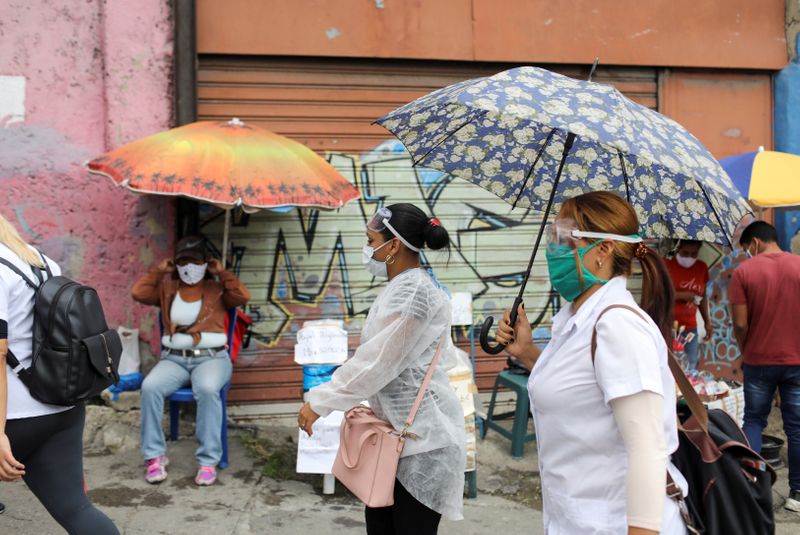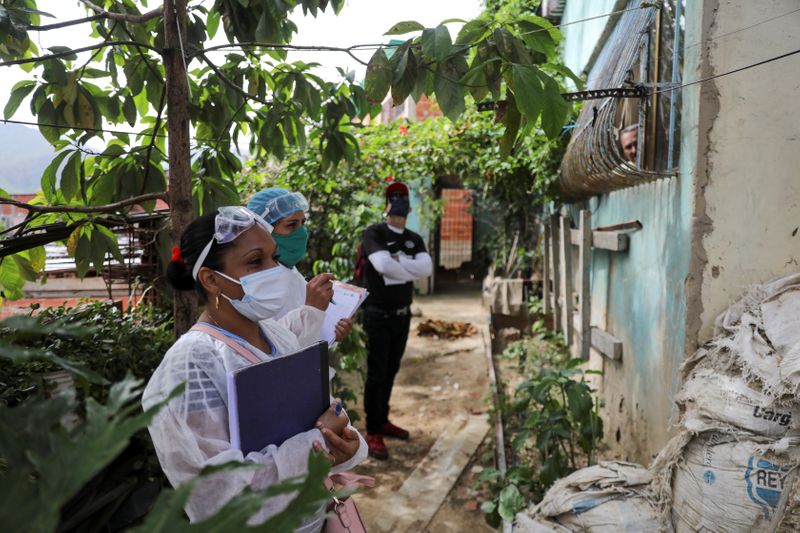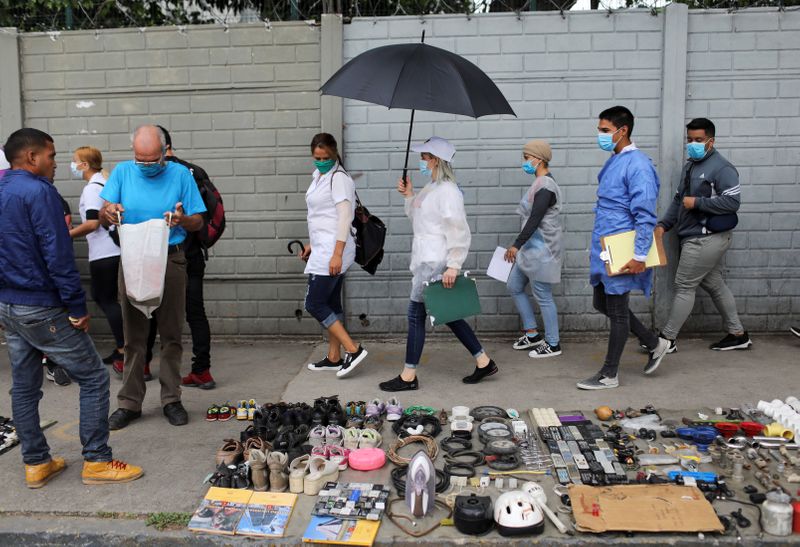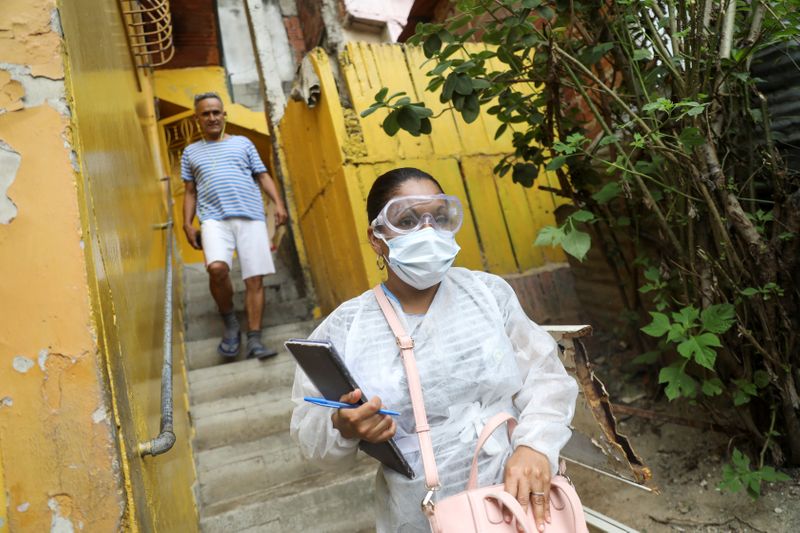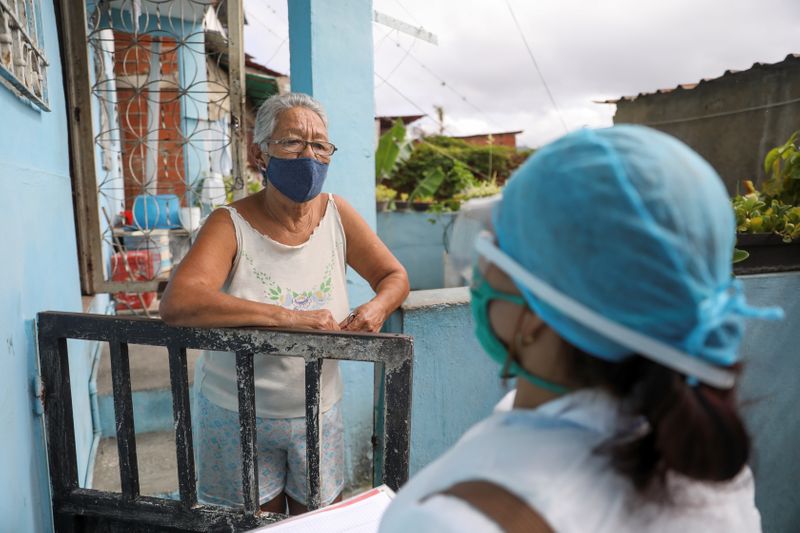CARACAS (Reuters) – Coronavirus cases in Venezuela have jumped in recent weeks and two top lieutenants of President Nicolas Maduro have tested positive, triggering warnings from health workers that the pandemic may overwhelm the country’s already battered healthcare system.
Venezuela’s case count began to accelerate last month and is rising by more than 30% every week, according to Dr. Julio Castro, part of a medical advisory team working with opposition leader Juan Guaido.
President Nicolas Maduro says his government has handled the pandemic better than neighboring nations, noting its 10,010 cases – a figure disputed by the opposition – are a fraction of those in Colombia and Brazil.
But the recent spike in the case count – which now includes Socialist Party Vice President Diosdado Cabello and Oil Minister Tareck El Aissami – signals that Venezuela’s precarious health system will be tested by the pandemic.
The country’s hospitals already suffer from constant blackouts, lack of running water, and chronic shortages of basic supplies, according to human rights groups and health workers.
Irene Guedes, 54, a housewife in the impoverished Bermudez 1 neighborhood in southwest Caracas, said she was in contact with a couple who tested positive for the novel coronaries last week.
On Tuesday, she received a visit from a government public health brigade that knocked on doors in the area to find out who had symptoms for COVID-19, the disease caused by the virus.
“I feel dizzy … I can’t smell anything,” said Guedes, wearing a white cloth face mask and a black sweater with a hood that covered her head.
Losing one’s sense of smell and taste are known symptoms of the disease.
Dr. Wilfredo Sanchez, part of the 15-member health brigade, recommended she get tested at a nearby health center.
Guedes’ neighbor Analeida Games, 61, said she and her husband Orlando Perdomo, 57, suffered fever and aching bones – but that neither had gotten tested.
“That was just a flu,” Games told another member of the brigade.
The government has done nothing to address these problems since declaring a strict quarantine in early March, said Jose Manuel Olivares, a doctor and legislator who is also part of Guaido’s health advisory team.
“The government … did not buy ventilators. It did not improve the hospitals. It did not repair x-ray (machines). It did not do what needed to be done,” he said in a telephone interview.
Venezuela’s roughly 300 public hospitals have 23,000 beds ready to receive patients, according to official figures.
Health worker groups say 12 doctors and two nurses have died from COVID-19, and a lack of protective equipment was raising infection risks for other medical personnel.
The information ministry did not reply to a request for comment.
Maduro on Tuesday defended the country’s response to the pandemic, and said foreign news agencies including Reuters were focusing on negative incidents while ignoring positive developments.
“In Venezuela, everyone (with coronaries) goes to the hospital – everyone,” Maduro said during an evening broadcast. “Every is attended to, nobody is wandering around in the streets or abandoned in their homes.”
Medical experts have warned about weak hospital infrastructure, and say coronaries testing is limited because the government has only authorized a single laboratory to carry out tests.
Maduro attributes the increased infection rate to the return of Venezuelan migrants from neighboring countries, saying it was a sign that Colombia and Brazil have mismanaged the pandemic.
Maduro and members of his cabinet have talked about the “Colombian virus” and claimed it is a more aggressive strain, without citing supporting medical evidence. They have claimed that this, in part, explains the situation in the border state of Zulia, which has emerged as a hot spot for the disease. [L1N2DZ1FM]
Some doctors in Guaido’s medical advisory team dispute the idea of a Colombia strain of the virus, and say the Zulia outbreak has been driven largely by a breakdown of basic services such as power and water.
(Writing by Brian Ellsworth; Editing by Bernadette Baum)

